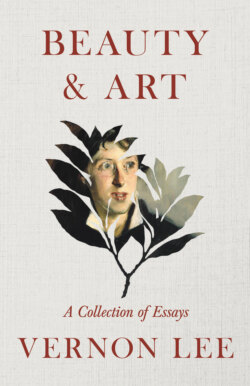Читать книгу Beauty & Art - A Collection of Essays - Vernon Lee - Страница 15
На сайте Литреса книга снята с продажи.
IX
ОглавлениеDelight in beautiful things and in beautiful thoughts requires, therefore, a considerable exercise of the will and the attention, such as is not demanded by our lower enjoyments. Indeed, it is probably this absence of moral and intellectual effort which recommends such lower kinds of pleasure to a large number of persons. I have said lower kinds of pleasure, because there are other enjoyments besides those of the senses which entail no moral improvement in ourselves: the enjoyments connected with vanity and greed. We should not—even if any of us could be sure of being impeccable on these points—we should not be too hard on the persons and the classes of persons who are conscious of no other kind of enjoyment. They are not necessarily base, not necessarily sensual or vain, because they care only for bodily indulgence, for notice and gain. They are very likely not base, but only apathetic, slothful, or very tired. The noble sport, the intellectual problem, the great work of art, the divinely beautiful effect in Nature, require that one should give oneself; the French-cooked dinner as much as the pot of beer; the game of chance, whether with clean cards at a club or with greasy ones in a tap-room; the outdoing of one's neighbours, whether by the ragged heroes of Zola or the well-groomed heroes of Balzac, require no such coming forward of the soul: they take us, without any need for our giving ourselves. Hence, as I have just said, the preference for them does not imply original baseness, but only lack of higher energy. We can judge of the condition of those who can taste no other pleasures by remembering what the best of us are when we are tired or ill: vaguely craving for interests, sensations, emotions, variety, but quite unable to procure them through our own effort, and longing for them to come to us from without. Now, in our still very badly organised world, an enormous number of people are condemned by the tyranny of poverty or the tyranny of fashion, to be, when the day's work or the day's business is done, in just such a condition of fatigue and languor, of craving, therefore, for the baser kinds of pleasure. We all recognise that this is the case with what we call poor people, and that this is why poor people are apt to prefer the public-house to the picture gallery or the concert-room. It would be greatly to the purpose were we to acknowledge that it is largely the case with the rich, and that for that reason the rich are apt to take more pleasure in ostentatious display of their properties than in contemplation of such beauty as is accessible to all men. Indeed, it is one of the ironies of the barbarous condition we are pleased to call civilisation, that so many rich men—thousands daily—are systematically toiling and moiling till they are unable to enjoy any pleasure which requires vigour of mind and attention, rendering themselves impotent, from sheer fatigue, to enjoy the delights which life gives generously to all those who fervently seek them. And what for? Largely for the sake of those pleasures which can be had only for money, but which can be enjoyed without using one's soul.
